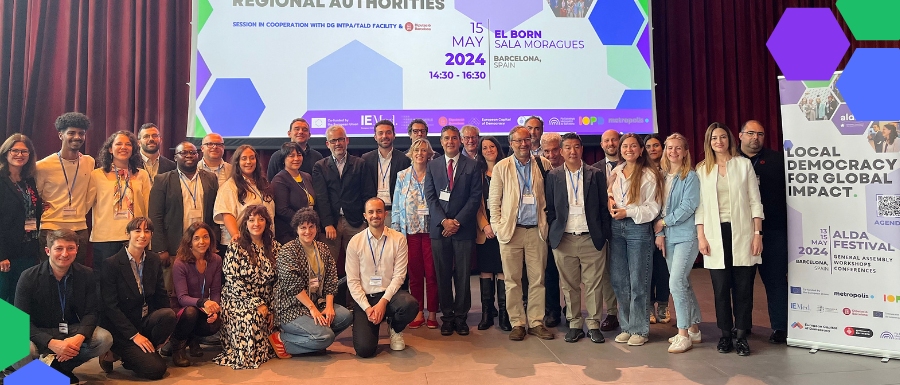On the afternoon of May 15, 2024, the ALDA Festival and General Assembly hosted an amazing event entitled “Introduction to TALD for CSO and Local and Regional Governments: presenting the methodology and raise awareness on how to use it” within its framework, focusing on advancing territorial development and decentralisation.
This year’s assembly emphasised the European Consensus on Development (2017), reaffirming the EU’s commitment to poverty eradication and the integration of economic, social, and environmental dimensions of sustainable development.
The European Consensus on Development outlines a holistic vision where poverty eradication remains the primary objective. This vision integrates sustainable development’s economic, social, and environmental aspects. Central to this approach is the concept of territorial development, increasingly recognised for its effectiveness in addressing global challenges through tailored, localised strategies.
Territorial approaches to development leverage the collective efforts of community actors to address common challenges through context-specific actions and policies. These approaches view territories as governance spaces where local actors can conceive and implement future projects, embodying a bottom-up methodology essential for sustainable development.
The Territorial Approach to Local Development (TALD)
The European Commission has crafted its territorial strategy known as the “Territorial Approach to Local Development” (TALD). TALD aligns seamlessly with the principles of the Territorial Perspective for Development (TP4D) promoted by the International Alliance, fostering a development perspective rooted in territorial specificity. In the broader debate, the territorial approach is seen as a potent tool for addressing the objectives of the EU’s Global Gateway strategy, which aims to incorporate subnational entities into the development process. The Global Gateway, as articulated by European Commission President Ursula von der Leyen, represents “a template for how Europe can build more resilient connections with the world.” This strategy is crucial in narrowing the global investment gap and enhancing global development partnerships.
Key Workshops and Discussions
The ALDA Festival and General Assembly 2024 featured a workshop that delved deeply into these themes, divided into two crucial segments. The first part established a methodological framework for the TALD approach, elucidating its implications and advantages for the involved territories. This segment aimed to provide attendees with a comprehensive understanding of how TALD can foster sustainable local development.
Antonella Valmorbida, ALDA Secretary General, kicked off the workshop with introductory words and the presentation of ALDA’s flagship initiative on TALD. Her insights set the stage for a comprehensive exploration of the territorial approach, highlighting its significance and potential impact on local development.
Eugène Zapata Garesché, Team Leader of the TALD Facility, then delved into the specific tools and opportunities that the TALD methodology offers. His presentation provided practical insights and frameworks that territories can adopt to enhance their local development strategies.
The second part of the workshop shifted focus to the current state of decentralisation policies on the African continent. Agustí Fernández de Losada, Senior Research Fellow and Director of the Global Cities Programme at CIDOB (Barcelona Centre for International Affairs), presented the key findings of a recent Decentralisation Study in Africa (2023) conducted by the TALD Facility. His analysis covered recent policies and decisions influencing decentralisation, the challenges faced by Africa’s local and regional governments, and potential opportunities for EU support.
This discussion was particularly pertinent in light of the 10-year anniversary of the 2013 European Commission Communication “Empowering Local Authorities in Partner Countries for Enhanced Governance and More Effective Development Outcomes.”
The ALDA Festival and General Assembly 2024 underscored the importance of territorial development and decentralisation as vital components of sustainable development. Through focused workshops and insightful presentations, the event highlighted how localised, community-driven approaches can address global challenges and foster resilient, inclusive growth.
As we come together to exchange insights, strategies, and innovations, the ALDA Festival and General Assembly 2024 promises to be a symbol of collaboration and progress, highlighting the transformative power of territorial development in shaping sustainable futures.
